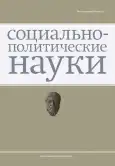The problem of the “Chinese threat” and the influence of China’s “soft power” on the shaping of the state’s foreign policy
- Authors: Qu C.1
-
Affiliations:
- St. Petersburg State University
- Issue: Vol 13, No 2 (2023)
- Pages: 137-143
- Section: International Relations, Global and Regional Studies
- URL: https://journals.eco-vector.com/2223-0092/article/view/516507
- DOI: https://doi.org/10.33693/2223-0092-2023-13-2-137-143
- ID: 516507
Cite item
Abstract
Along with the growth of economic power, China is gaining more and more influence in the world. Nevertheless, we can say that the distribution and export of foreign culture in China is relatively insufficient. The emergence of Confucius Institutes built bridges between Chinese culture and other states. The article focuses on the role of Confucius Institutes in improving the image and soft power of China. Confucius Institute has become a pioneer in the dissemination of traditional Chinese culture due to its significant value and significance, achieving the transmission and promotion of excellent traditional Chinese culture, completing the exchange and sharing of various cultures and improving its own system of cultural development, achieving its goals through scientific management and functioning beyond expectations, as well as allowing the international community to understand the deeper subtext of Chinese culture.
Full Text
About the authors
Chang Qu
St. Petersburg State University
Author for correspondence.
Email: st073275@student.spbu.ru
postgraduate student at the St. Petersburg State University. St. Petersburg, Russian Federation.
Russian Federation, St. PetersburgReferences
- Shelomikhin O.A., Petrasyak M., Kireev A.A. et al. Modern China and its environment. D.V. Kuznetsov, D.V. Buyarov (eds.). Moscow: URSS, 2014. 440 p.
- China’s Road to Peaceful Development. White Paper. URL: http://news.xinhuanet.com/politics/2005-12/22/content_3954937.htm (data of accesses: 22.02.2023).
- Differences in the perception of “Chinese soft power” between China and the United States. URL: https://fr.hujiang.com/new/p1073654/ (data of accesses: 15.02.2023).
- Haitao J. The Composition and Measurement Formula of Cultural Soft Power. Cultural Studies. 2011. No. 7.
- Renwei H., Jian H. China’s peaceful development path and soft power building. Social Science. 2007. No. 8.
- Wei Y., Hua Z. A friend in the sea is like a neighbor at the end of the world – Remembering Xu Lin, a counsellor of the State Council, former director of the State Hanban and director general of the Confucius Institute Headquarters. American Literature (First Half Moon), 2020. No. 1. Pр. 124–130.
- Xiping Z. A Brief discussion on the soft power function of Confucius institutes. World Chinese Language Teaching. 2007. No. 3.
Supplementary files








